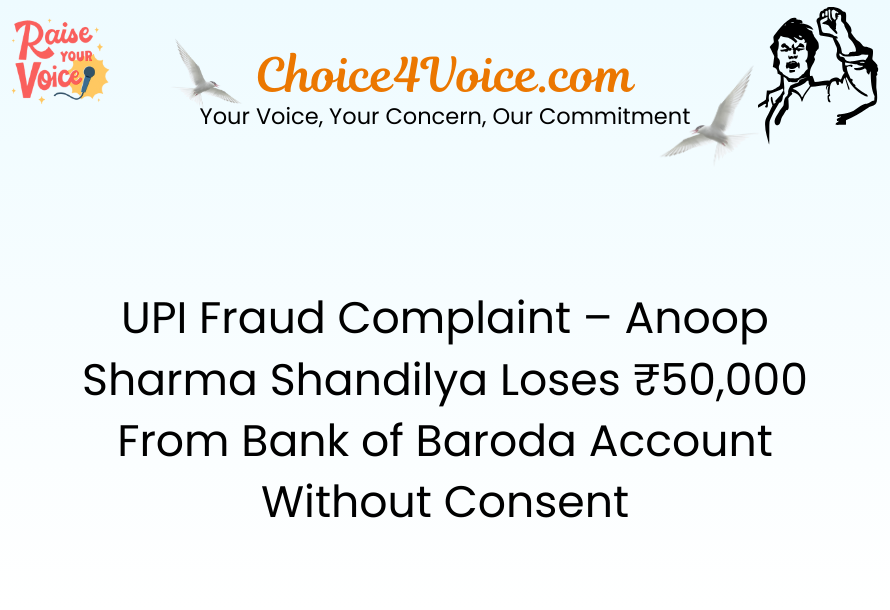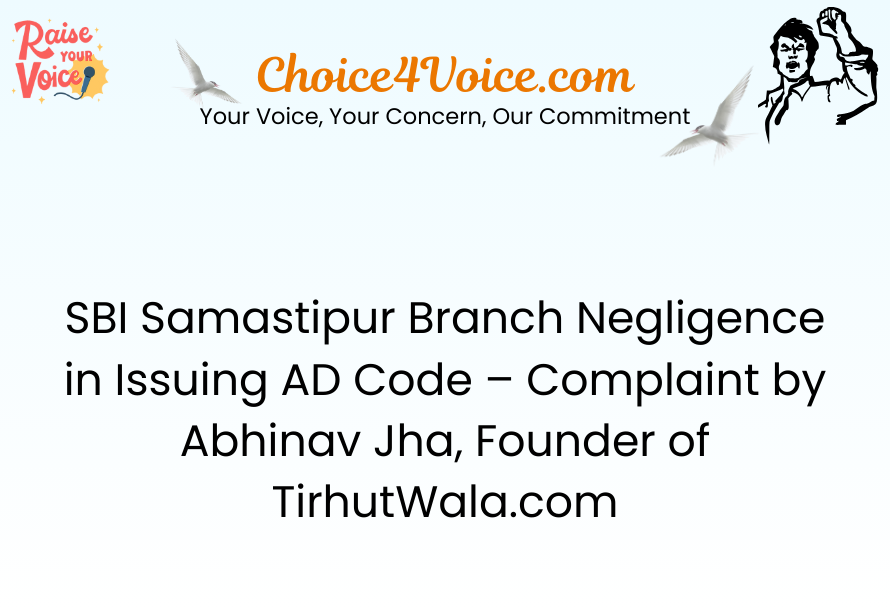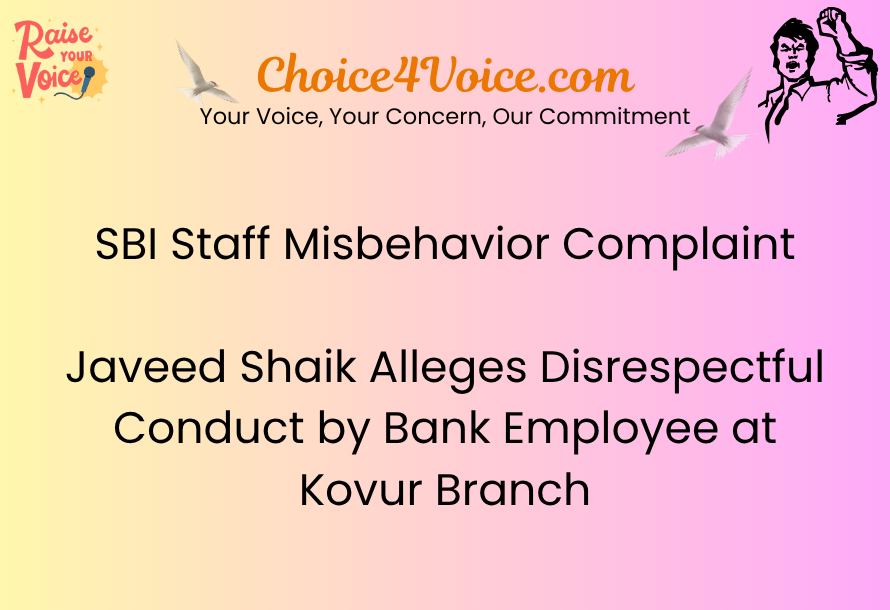If you’re experiencing this problem with this brand or any other company, submit your complaint and we may feature it on Choice4Voice.com.
Submit your complaint →Anoop Sharma Shandilya reports a UPI fraud where ₹50,000 was deducted from his Bank of Baroda account without initiating any transaction. Despite complaints, no resolution has been provided. This case raises serious concerns about digital banking security and customer protection.
Note: If this issue is resolved, the concerned brand or the complainant may contact us at support@choice4voice.com. After proper verification, we will either update this article as “Resolved” or delete it, ensuring fairness to both parties.
Complaint Summary : UPI Fraud Complaint – Anoop Sharma Shandilya vs Bank of Baroda | ₹50,000 Deducted Without Approval
| Customer Name | Anoop Sharma Shandilya |
|---|---|
| Company/Bank | Bank of Baroda |
| Complaint Type | UPI Transaction Fraud / Unauthorized Deduction |
| Account Type | Savings Account |
| Fraud Amount | ₹50,000 |
| Date of Incident | Recently (Exact date not mentioned in post) |
| Complaint Details | ₹50,000 was fraudulently deducted from the customer’s Bank of Baroda account via UPI without his consent. Despite raising complaints, the issue remains unresolved. |
| Original Post URL | LinkedIn Source |
Detailed Write-Up
The Incident
Anoop Sharma Shandilya, a savings account holder with Bank of Baroda, recently fell victim to a serious case of UPI fraud. Without initiating any transaction, a sum of ₹50,000 was deducted from his account via UPI and credited to an unknown beneficiary account.
Key Concerns Raised by the Customer
- The transaction was unauthorized and unapproved.
- The money was transferred to an unidentified account.
- Despite filing complaints with Bank of Baroda, no satisfactory resolution has been provided.
Larger Issues Highlighted
This incident exposes critical gaps in digital banking security, especially in UPI transactions, which are widely promoted for convenience and speed. Such frauds can lead to:
- Financial losses for customers.
- Erosion of trust in digital payment systems.
- Increased consumer vulnerability if grievance redressal is slow or ineffective.
Customer’s Demands
- Immediate resolution of the complaint and refund of ₹50,000.
- Stronger security checks for UPI transactions.
- Faster grievance redressal mechanisms to support victims of fraud.
- Accountability from banks and regulators to protect consumers from financial fraud.
FAQs – UPI Fraud Complaint Against Bank of Baroda
Q1. What happened in Anoop Sharma Shandilya’s case?
₹50,000 was fraudulently deducted from his Bank of Baroda account via UPI without his approval.
Q2. Was the transaction authorized by the account holder?
No, the customer stated he did not initiate or approve the transaction.
Q3. Where was the money transferred?
The funds were credited to an unknown account, identity not disclosed.
Q4. Did Bank of Baroda provide a resolution?
As per the complaint, the bank has not provided any satisfactory response.
Q5. Can unauthorized UPI transactions be reversed?
Yes, if reported immediately, banks can initiate chargebacks and involve NPCI for investigation.
Q6. What should a customer do in case of UPI fraud?
- Immediately report to the bank.
- Call the National Cyber Crime Helpline (1930).
- Register a complaint on cybercrime.gov.in.
Q7. Who regulates UPI in India?
UPI is regulated by the National Payments Corporation of India (NPCI) under the guidance of the RBI.
Q8. What security measures should banks adopt?
- Real-time fraud detection systems.
- Transaction alerts with confirmation steps.
- AI-driven anomaly tracking.
Q9. Can customers seek compensation for UPI fraud?
Yes, under the RBI guidelines on unauthorized electronic transactions, banks are required to compensate customers if the fault is not theirs.
Q10. What is the liability of customers in such cases?
If customers report within the prescribed timeline and negligence is not on their part, banks bear the liability.
Q11. How fast should banks resolve such complaints?
RBI mandates that complaints be resolved within 90 days, but customers demand faster action in high-value frauds.
Q12. Why is grievance redressal important in digital banking?
Because customer trust depends on how effectively banks handle fraud and ensure financial security.
Q13. What preventive measures can customers take?
- Avoid sharing UPI PINs/OTPs.
- Regularly monitor account balances.
- Use trusted devices and secure networks.
Q14. Is UPI fraud common in India?
Yes, with the increasing adoption of UPI, fraud cases are on the rise if proper safeguards are not followed.
Q15. Can police and cybercrime cells help in such cases?
Yes, lodging an FIR or cybercrime report can help track the fraudulent account and recover funds.
Q16. What are the RBI guidelines on electronic frauds?
RBI states that customers must not be held liable if they report unauthorized transactions promptly.
Q17. How can NPCI assist in resolving such disputes?
NPCI investigates UPI-related fraud complaints and coordinates between banks for resolution.
Q18. Why is this case significant for digital banking customers?
It highlights the urgent need for stronger UPI safeguards and faster complaint handling.
Q19. What lessons can other customers learn from this case?
- Report fraud immediately.
- Keep records of all complaints.
- Escalate to higher authorities if delays occur.
Q20. What is the consumer’s appeal in this case?
The consumer requests refund, stronger security measures, and accountability from Bank of Baroda and regulators.
Choice4Voice.com Is Here to Help You
If you are facing a similar issue and would like our support in highlighting your concern, we are here to assist.
Simply write a LinkedIn post and tag our official page Choice4Voice.com
Submit your complaint directly : https://choice4voice.com/submit-your-complaint/
Our team will review and feature your case on our website to ensure it gets the attention it deserves.



